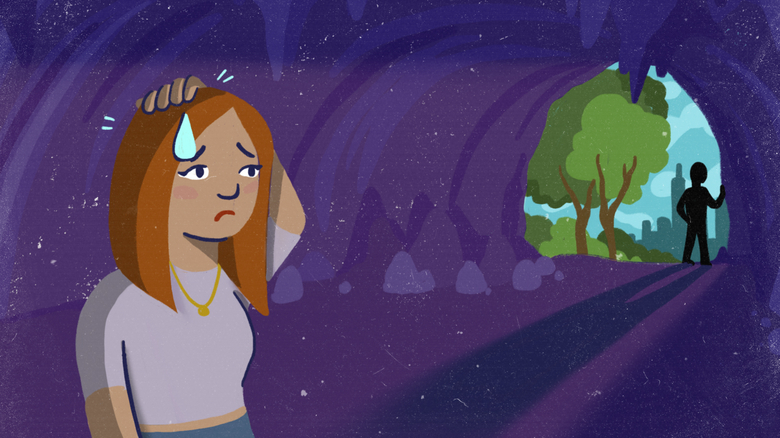Tips for Managing Anxiety After Confinement 1:06
(CNN) -
After more than a year of staying home and following strict safety guidelines, many people are understandably reluctant to walk out their front door and re-enter society.
Some are downright terrified.
Psychiatrist Dr. Arthur Bregma calls this fear "cabin syndrome," a non-medical term he has coined.
In his practice in Coral Gables, Florida, he found that many of his patients were nervous about leaving their homes and interacting with others when COVID-19 restrictions were lifted.
However, some of his patients felt a bit uncomfortable while others took their fear to extremes.
"I've seen patients who are locked in their room at home" while making telemedicine calls "and wearing a mask," Bregman said.
advertising
More than a year without leaving home due to covid-19 4:32
During the last two months, Bregman has seen people with moderate cases who have asked him to give them a disability note to prevent them from going to work in person.
Finding the courage to get out of the cave
When Bregma notices that a patient is afraid to leave home, he said he teaches them his AVM system, which stands for "mindfulness, attitude and vision," which he developed this year.
The first step is to be aware of what is bothering you and focus on reducing what that is, he said.
Once you know what makes you nervous, Bregman said it's time to start developing a positive attitude.
It is important to have a positive mindset and believe that good things can happen when you leave your home, he said.
A great way to develop this positivity is to imagine all the great activities you participated in before the pandemic, like eating indoors with friends or attending concerts, Bregman noted.
A
nalysis: Our aversion to "return to normal" goes beyond the office.
This is why
The last step is to visualize your goals and what you can accomplish when you come out of your "cave," he said.
The sooner people can make this system, the better, added Bregman.
"The longer people are in their cave, the more difficult it will be to get out," he said.
Some reluctance is normal
"Cabin syndrome" is not a formal diagnosis, which must go through an approval process before entering the Diagnostic and Statistical Manual of Mental Disorders.
The DSM is a publication of the American Psychiatric Association and serves as a dictionary of mental disorders.
Many people feel uncomfortable going out into the world, which is normal and to be expected, said Dr. Alan Teo, associate professor of psychiatry at Oregon Health and Science University in Portland.
Teo said he is cautious about applying the term "cabin syndrome" to what for many is a normal range of experiences.
The impact of the pandemic on sexual relationships 0:55
What many people may experience after living in a pandemic for a year is anxiety, which is a normal and appropriate emotion to experience when faced with such a traumatic event, he said.
Experiencing anxiety doesn't mean you have a disorder or syndrome, he said.
There are cases in which it becomes clinically serious.
If you can't leave your home and resume your normal life, Bregman recommends seeking professional help.
Strategies to face your fear
One method that can help you break out of your cocoon is downward social comparison, Teo said.
Instead of a bottom-up social comparison, when comparing yourself to others who socialize more than you, he recommends that you compare yourself to those who socialize less than you.
With top-down social comparison, "it helps you feel a little better about yourself," Teo said.
Some modest, bottom-up social comparison may encourage you to socialize more, but if you start comparing yourself to your friend who goes out every night, you may start to feel bad about yourself, he warned.
On the other hand, "don't feel pressured to do what the other person is doing," Teo said.
Some people are introverts and feel drained after long periods of social interaction, which he says is perfectly normal.
Biden asks to be vaccinated now to reach 70% of inoculated 1:22
Teo also suggested that people try a behavior-based approach called exposure prevention and response.
It's a clinical strategy in which you gradually expose yourself to what you fear, in this case social interaction, and work your way toward more challenging social experiences.
An easy way to think of this approach is to imagine that you are climbing a ladder, Teo said.
For the first "rung," you can try taking a walk with a friend.
For a higher "rung," you could go to a party, he said.
Larreta: "The contagion is greater in closed places, not in open ones"
People haven't had to use their social skills as small talk as often in the past year, so it's okay to not have practice, Teo said.
And when we interact with others, it may seem different.
Instead of talking about the weather, people could be talking about the status of the vaccine and whether you should wear a mask in a specific social situation.
"We were resilient in adjusting to spending more time alone at home, and I think with practice those social skills will come back," Teo said.
Covid-19 pandemic impact Emotional health

